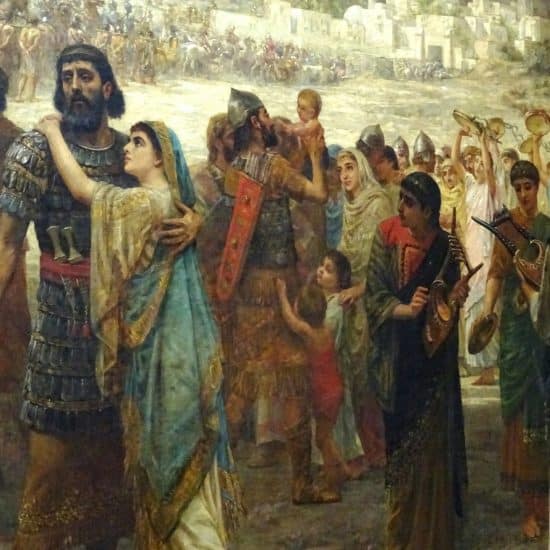 Ehud’s cunning
Ehud’s cunning
Formations: July 10, 2016
Scripture: Judges 3:12-30
 Michael OlmstedToday’s story is not a bedtime tale for little children. No sweet dreams here! It would make an “R” rated movie.
Michael OlmstedToday’s story is not a bedtime tale for little children. No sweet dreams here! It would make an “R” rated movie.
Ehud’s story reminds me the Bible was not compiled by an editor who worked to portray Israel as sweet, noble, and always right in a complicated world. Like any history, the truth is told even if it reminds us of our unholy world, our flaws, and God’s ever available grace. Once again the children of Israel did “things the Lord saw as evil” (v.12) and are now oppressed by a pagan coalition of Moabites, Ammonites, and Amalekites. For eighteen years Moab’s King Eglon has threatened Israel and extorted crippling payments.
The horrors and injustices of that time are not so different from the ghastly violence and fear reported on our nightly news. But our world is not exactly like that world, except for computers and the massive killing machines of today. This story is told from a perspective of a warrior nation led by a warrior God, but we read it from the advantage of our advanced understanding of God’s grace and the testimony of Jesus’ life and words. Ehud is not exactly what we want our children to become and murder is not the preferred method for defeating evil.
Ehud, the left-handed son of Gera, from the tribe of Benjamin, shows up one day to deliver Israel, once again from a mess they themselves have created. The text literally says Ehud is “a man bound of right hand” which is curious because he is of the tribe of Benjamin, which means “son of my right hand.” Some scholars note that being left-handed was suspect or even a flaw in that culture. But the advantage in this story is that because Ehud is left-handed the king’s guards would not know to look for a hidden weapon on his right side. A right-handed assassin would conceal his weapon on the left side for easy accessibility. So Ehud has a plan, crafting a two-edged sword, two and a half feet long, strapped to his right thigh under his robe. He is assigned to deliver the latest tribute payment to Moab’s King Eglon. When the formalities were accomplished and the money handed over, Ehud sent the rest of his delegation out of the palace and enticed the king with “I have a secret message for you, King” (v.19).
The king sent his attendants away and took Ehud into “his cool second-story room,” where Ehud heightened the sense of conspiracy with “I have a message from God for you” (v.20). Then comes the reason for our “R” rating: Ehud pulls out his hidden sword and plunges it into the king’s fat stomach, burying the weapon until the handle disappears! Our translation describes the king’s guts as spilling out, but the Hebrew is even more graphic: “his excrement spilled out” (v.22). Ehud locked the doors as he left. The respectful servants could not get in, assumed the king was “relieving himself in the cool chamber” (v.24) and waited too long to force the door open. Ehud was long gone when they found the king’s body.
Ehud called Israel to arms, closed the borders along the Jordan and led an army to defeat the Moabites (vv.26-30). Ehud disappears from the scene and Israel experiences peace for eighty years. The evil king is killed, his army defeated, and Israel lives happily ever after. Not quite! The cycle of sin, suffering, deliverance, prosperity, and degeneration starts over.
This tale is not easily used to prove the ultimate power of good over evil. The evil king and God’s deliverance are clear, but the background of Israel’s repeated turning from God and assassination as God’s chosen method are problematic. Our world witnesses many violent, unjust and murderous acts in the name of “god.” So how do we handle this story?
Ehud stands as one person in a world of injustice and suffering, a world without knowledge of God’s truth. Think about the singular characters in the unfolding story of God’s grace in the Bible: Abraham, Joseph, Moses, Joshua, David, Isaiah, Elijah, Mary, John the baptizer, John, Peter, and many others. Even in our secular world we celebrate those individuals who led us to significant discoveries, military victories and social changes. Don’t forget missionaries, those who help the poor, the hungry and all who are denied freedom and opportunity. Most social revolutions and necessary changes are begun by individuals who dare to step forward and call us to action.
Ehud is one of those “left-handed heroes” who heard God’s voice and said “Enough!” We need to stop thinking someone else can hear God and act. In Matthew 38:35-58 Jesus saw a world in need and told his disciples the world is in need and suffering, like sheep without a shepherd…. we must cry out to God to raise up workers to bring hope and help…. we must be willing to go and do. Jesus was not necessarily talking about needing more preachers. The need is for all who will share his grace, not just in words, but by their actions.
I do not subscribe to the idea that the United States is some kind of “new Israel,” protected or guaranteed special blessings. That kind of thinking leads to pride, even the idea that we deserve more than anybody else. But we do have unusual freedom, resources and opportunities. Israel had eighty good years after Ehud – then it all fell apart again. Because of our freedoms, especially religious freedom, we can do more to change not only our nation, but our world. The key is our faith in God who blesses his people, who gives us abundance to share, who sends us to model love, forgiveness, and a new way to live.
Judges is not a directive to violence or temporary reformation or military dominance. God is calling us to live by his love and moral guidelines, to show the world the better way of Christ. Ehud was a temporary deliverer. Jesus is the ultimate deliverer and we must be his people or nothing will really change. Cunning can never substitute for grace!
Retired after 46 years in pastoral ministry, Michael K. Olmsted enjoys family, supply preaching and interim work, literature, history, the arts and antiques.
Formations is a curriculum series from Smyth & Helwys Publishing, Inc. through NextSunday Resources.
The PDF download requires the free Acrobat Reader program. It can be downloaded and installed athttps://get.adobe.com/reader.



